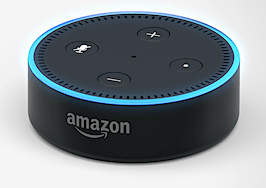New data suggests that 2019 could be a boom year for smart video doorbells as Americans increasingly adopt home automation technology.
The data, from market research firm Parks Associates, indicates that 25 percent of U.S. households with broadband plan to buy a smart video doorbell this year. If all, or even most, of those households go through with their plans, it would represent a massive jump in the number of homes with smart doorbells; according Parks Associates, only 8 percent of homes with broadband had a smart doorbell during the final months of 2018. At the end of 2017, a mere 7 percent of broadband homes had a smart doorbell.

Google’s Nest Hello video doorbell. Credit: Google.
Smart doorbell models vary from company to company, but typically include a bell as well as a camera that allows homeowners to see who has come to visit. Popular models allow homeowners to access the video feed on their phones, and many integrate into other smart home technology. They have been marketed as providing both convenience and safety.
About 88 percent of U.S. homes currently have broadband, Parks Associates also reported. The new data on smart video doorbell adoption was based on a survey of 10,000 households across the U.S.
Do you plan to buy a smart doorbell this year? Let us know:
The growth of smart video doorbells comes as consumers face an increasing number of options for home automation. Large companies — such as Google with its Nest smart thermostat and related products — have been making inroads into the sector for years, but competition has intensified more recently with numerous devices promising to apply technology to lighting, locks and energy generation, among other things.
Last year, Amazon made headlines after acquiring smart doorbell maker Ring in a deal estimated to be worth more than $1 billion.
However, adoption of smart home technology does face challenges. Ring, for example, has raised concerns about privacy as it developed social networking features.

Paul Palmer
Commenting on the spread of smart video doorbells, Paul Palmer — an executive at cyber security firm F-Secure — said in a statement Thursday that his company found that more than two thirds of consumers are concerned about security related to smart home devices. Other challenges have to do with cost and set up.
“There are several challenges in driving the uptake of smart home products and services such as interoperability issues, difficult setup, high prices, slow replacement cycle of household devices as well as security and privacy concerns,” Palmer said in the statement.












